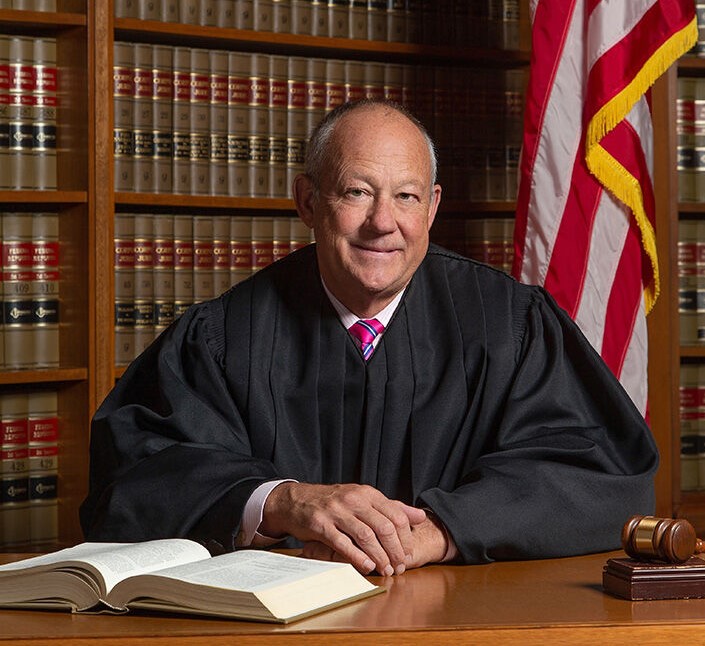Forest Service Can’t Be Sued Over 2018 Wildfire, Court Rules
Dozens of plaintiffs may be unable to seek damages from Roosevelt Fire
- Published In: Other News & Features
- Last Updated: Sep 18, 2023

Firefighters monitor the Roosevelt Fire near Bondurant during nighttime operations on Sept. 25, 2018. A group of property owners who lost homes in the fire have been turned away in their attempt to collect damages from the U.S. Forest Service over its management of the blaze. (Courtesy photo from the U.S. Forest Service via Wikimedia Commons)
By CJ Baker
Special to the Wyoming Truth
The U.S. Forest Service can’t be sued for the way it managed a 2018 blaze that destroyed dozens of homes near Bondurant, an appellate court has ruled.
Two couples whose property burned, the service district of the subdivision ravaged by the fire and a pair of hunters who suffered serious burns escaping the fast-moving flames filed suit against the Forest Service in 2021, alleging the agency mishandled the Roosevelt Fire.
The plaintiffs’ primary allegation was that, despite federal policies that required full suppression, federal officials initially tried letting the Roosevelt Fire burn to benefit the Bridger-Teton National Forest’s natural resources. Had the Forest Service immediately moved to put out the human-caused fire, the damage would have been averted, the plaintiffs contended in their complaint.
However, a three-judge panel at the Tenth Circuit Court of Appeals ruled Friday that, even if forest managers tried using the fire as a tool, they had the discretion to do so.
Joined by colleagues Nancy Moritz and Veronica Rossman, Judge Timothy Tymkovich wrote that managers needed to protect private property and keep firefighters and residents safe with limited resources. Given the competing interests, Tymkovich said it’s no wonder courts defer to fire managers “time and again.”

“The task of balancing these interests is best lodged with officials and experts on the ground than with judges aided by the benefit of hindsight,” he wrote.
The decision affirmed a similar ruling from U.S. District Court Judge Alan Johnson; he found the Forest Service was immune from the suit in April 2022, which prompted the appeal.
Just days before the Tenth Circuit issued its decision, two dozen other landowners who suffered losses in the Roosevelt Fire filed a very similar suit in Wyoming’s U.S. District Court, represented by the same attorneys who brought the 2021 litigation. Friday’s decision leaves that case at risk of being similarly dismissed.
‘A high probability of remaining manageable’
The Roosevelt Fire was initially reported on Sept. 15, 2018 by Steven and Dakota Knezovich, a father and son from Rock Springs who were hunting in the Bridger-Teton. According to their suit, the Knezovichs thought the Forest Service would extinguish the blaze. The following day, however, backcountry rangers told them to leave the area. The men initially believed they had a few hours to make it back to the trailhead, but while on their way, a ranger warned the fire was closing in.
“The Knezovichs immediately made all haste to depart before the fire could cut them off,” the complaint stated. “During what became a harrowing, life-changing effort to escape, however, both Knezovichs were surrounded by fire and nearly trapped.”
They made it to safety, but only after suffering severe burns to their torsos, arms and faces that left permanent injuries.
The Forest Service said it initially worked to evacuate hunters and visitors from the area while monitoring the fire, which was burning in “steep timbered terrain largely surrounded by rocky steep slopes.”
“The fire has a high probability of remaining manageable with a smaller organization due to few values at risk,” fire managers wrote in the Wildland Fire Decision Support System.
That prediction proved overly optimistic. Over the coming days, the fire ripped across thousands of acres toward the Hoback Ranches subdivision, forcing the evacuation of 230 homes. The Forest Service brought in hundreds of firefighters to combat the blaze, but it ultimately consumed 130 structures — including 55 homes — across 61,500 acres.
The Knezovichs and two dozen property owners who suffered losses have sought to recover damages from the Forest Service. However, the U.S. government is generally immune from being sued.

Sovereign immunity
The Federal Tort Claims Act does allow individuals and businesses to sue for injuries caused by negligent acts of government employees. But there is a “discretionary function exception,” which makes the U.S. immune from litigation if the employees were performing a “discretionary” function or duty.
In their 2021 lawsuit and the one filed last week, the hunters, landowners and their attorneys, Quentin Rhoades of Missoula, Montana, and Bradley Booke of Jackson, contend the Forest Service didn’t have any discretion. They argue the agency was required to suppress the Roosevelt Fire as a matter of policy.
Rhoades and Booke point in part to the Interagency Standards for Fire and Fire Aviation Operations, known as the Red Book, which states: “Human caused fires and trespass fire must be suppressed safely and cost effectively and must not be managed for resource benefits.”
That policy was violated because, the plaintiffs argued, the Forest Service initially tried to manage the fire for resource benefits. They highlighted a Sept. 16, 2018 article from the Jackson Hole News & Guide in which Bridger-Teton spokeswoman Mary Cernicek was quoted as saying the Roosevelt Fire was “being used on the landscape to reintroduce fire in its natural role.”
But Judge Johnson noted the forest’s official plan logged in the Wildland Fire Decision Support System gave no indication of the fire being managed for resource benefits. Further, the fact that the Forest Service was managing multiple fires in the region with limited equipment and personnel “shows why discretion is necessary,” he wrote.
The Tenth Circuit agreed last week, finding the Red Book policy is only a guideline.
“To conclude otherwise would strip the Forest Service of its ability to balance the safety, conditions, weather, and resource requirements that go into any fire response,” Tymkovich wrote.
The plaintiffs had sought to gather more information about whether forest managers improperly considered resource benefits, but the appellate court said it would be irrelevant, because the Forest Service’s decisions are immune from suit.
At the lower level, the Knezovichs and landowners also argued the Forest Service failed to give them adequate warnings and information about the fire. Johnson, dismissed those claims as well, noting the service did provide “significant” warnings. He said the agency’s specific actions were discretionary and therefore immune from litigation.
In neither ruling did the judges reach the question of whether the Forest Service acted negligently.
Investigators determined the Roosevelt Fire was started by a recreationist who failed to fully extinguish a warming fire, and officials received a description of a “person of interest.” However, law enforcement has thus far been unable to identify the individual and they have yet to answer for the damage caused by the blaze.













